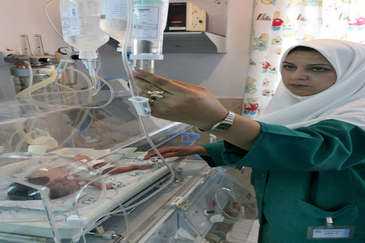Two Ahwazi Arab women reportedly died in labour within a few hours of one another on July 24 and 25 due to lack of blood for transfusion and medical negligence during the delivery of their babies. While the first woman gave birth shortly before passing away, the second died along with her unborn child.
In the first case, a 36-year-old mother of three children from the city of Khafajiyeh was taken to the local state hospital, the city’s Shaheed Chamran Hospital, when she went into labour with her fourth child. According to Iraj Nazari, an official at the University of Medical Sciences in Ahwaz city, the mother’s uterus prolapsed shortly after she gave birth and she began hemorrhaging blood. Due to her rare, negative blood type, the official explained, there were insufficient supplies of blood or even plasma at the hospital for transfusion. Nazari said that although staff at the hospital contacted the main hospital in the regional capital, Ahwaz city, to request immediate supplies of the blood type required, these did not arrive in time, and the mother passed away shortly afterwards, never having held her newborn baby. Nazari did not explain why insufficient supplies of the relevant blood type were stored at the hospital in preparation for such an emergency.
At 5 a.m. the next morning at the same hospital, a 23-year-old woman named Zaynab Saki from the town of Hoveyzeh, in her eighth month of pregnancy, was rushed in after experiencing contractions. Speaking to local media afterwards, her cousin, Najila Saki, explained that the mother-to-be was taken to the labour suite where medical staff examined the mother and conducted an ultrasound scan, ascertaining that the mother and baby were healthy and in a stable condition. The medical staff then decided to administer an injection to induce labour. Shortly after this, the mother became seriously ill and began bleeding heavily, possibly as an adverse reaction to the injection. Unable to deliver the baby and concerned for her health, doctors took the decision to send her immediately to the larger Imam Khomeini Hospital in Ahwaz city for treatment. Her cousin recalled that when they got there the desperately ill mother-to-be, who was clearly in need of specialist care, was instead handed over to a group of unqualified junior medical students who proceeded to carry out a botched examination which resulted in even heavier internal bleeding. The unborn baby, unable to survive outside the womb and suffering massive blood loss, died even before it could be born.
Although the traumatised mother-to-be was still alive at this point, Najila Saki explained that the improper medical procedures administered by the medical students meant that her cousin’s already critical condition went downhill fast, saying that as result of the heavy bleeding, her heart was massively weakened, with the additional trauma from the injections to induce labour and from another injection of anaesthetic being too much for body to withstand; she died just after dawn, without ever giving birth, with the dead baby still in her womb.
State medical officials admitted that medical negligence caused the death of the two Ahwazi Arab women within a few hours of each other. Although lack of the proper blood type was given as the official reason for the first woman’s death, it’s arguable that the real reason for both deaths, and for four children now being motherless orphans was sheer medical negligence and substandard treatment, which remain depressingly typical in the medical treatment administered to Ahwazi Arabs, with racism still very much literally a deciding factor in life or death for the people of Ahwaz.
C: R.H
S: aLiBz
